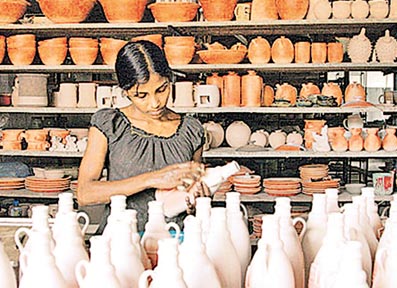The importance of invention in economic development
by Amila Muthukutti
Sri Lanka, having eradicated terrorism, is on the track of
development. Even though the country has many achievements such as
having the highest literacy rate in the region, it has been unable to
fully harness developmental opportunities which are natural resources
and peace.
There was a time when it was believed that the wealth or the
development of a country totally depends on its natural resources,
labour force and capital. However, many countries that did not have
these, have proved that development can be accelerated and wealth can be
created by inventive and innovative efforts.
 For instance, Switzerland which has a small population and no natural
resources, is not only one of the leading industrialised countries in
the world but also ranked at the first place of the Global Innovation
Index (GII) in 2014. This tells us a different story. Hence, it is
absolutely imperative to widely discuss the role of invention in Sri
Lanka's economic development. For instance, Switzerland which has a small population and no natural
resources, is not only one of the leading industrialised countries in
the world but also ranked at the first place of the Global Innovation
Index (GII) in 2014. This tells us a different story. Hence, it is
absolutely imperative to widely discuss the role of invention in Sri
Lanka's economic development.
Before going into detail, it is important to get an idea of what
invention and innovation means. Invention is simply an act of inventing
something for the first time. It is a novel idea which came out of the
science or technical background.
A patent needs to be obtained, so that the inventor can prove this is
a new idea and not copied from any other invention. Making an invention
commercial can be called innovation. This has to be introduced as a
process in which the invention is turned into a marketable product or
service which meets the needs of customers, resulting in profits.
Necessity is the mother of invention, while invention is the mother
of economic development. It is up to the Government to create the
eco-system supported by the private sector, where inventors can improve
themselves.
Developing economies such as ours can never afford to financially
support all the inventors. That is why, the role of the private sector
has to be emphasised in this regard.
Competition
Several indicators are used to measure the level of innovation in a
country among which the Global Innovation Index (GII) is important and
recognised. When analysing data relating to the level of innovation in
Sri Lanka, it can be seen that the country has gradually gone down in
the GII ranking.
Sri Lanka was at 94th position in 2012, 98th in 2013 and was ranked
105th in 2014. We, as a nation, cannot be happy about the rankings, as
the nation has lost its ranking year by year. The decreasing ranking
clearly reflects the country's inability to create a population with
innovative abilities and also poor allocation of resources for research
and development (R&D).
It will send a clear signal to investors that this is not the country
that they are looking for. We can no longer boast about the literacy
rate and free education, as they are unable to attract FDIs in the 21st
century.
Being innovative is considered to be a primary factor today for an
economy to be competitive. With high market competition, business
organisations need to be more innovative than in any other era. Be it a
country or a business, the one that spends on R&D and always invents
something new, will be the winner in this competition.
When compared to other developing countries such as China, Malaysia,
Thailand, and India, Sri Lanka lags behind in the number of innovations
and protection of innovations. Innovation is impossible without
research. Hence, a private-public mixed delivery system is a must.
The Government ought to take the leadership and encourage private
sector companies in this regard. A majority of expenditure on R&D is for
the agricultural sector. The country, being an agricultural economy,
should not neglect agricultural research. But, at the same time, there
has to be a focus on industrial research as well.
The Government can motivate private sector companies by introducing
some tax relief for R&D. Proper coordination between universities and
private sector companies is essential to accelerate the number of
inventions.
Research projects which are funded by the private sector and carried
out by universities can deliver better results. The prevailing peace is
a boon for inventions.
Sri Lanka has a large number of rural schools that do not have access
to science education which can be considered as a primary factor for
inventions. With the introduction of open economic policies, the
people's innovative mentality seems to have disappeared. However, it is
when a country makes more inventions that that country can produce more
and export more.
The Japanese economy and most recently, the South Korean economy are
the best examples in this respect. If not for Toyota, Honda and other
similar innovative companies, its economy would never have been like it
is today.
Invention is the mother of economic development, a formula that can
be applied in the Sri Lankan context as well.
The writer holds a BA in Economics from the University of Colombo. |

